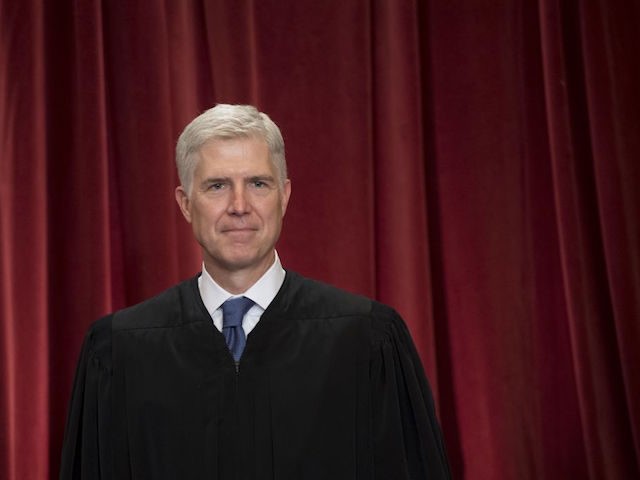Justice Neil Gorsuch celebrates his one-year anniversary on the Supreme Court on Tuesday, having been sworn in on April 10, 2017. His first year reveals what could become one of President Donald Trump’s greatest legacy achievements.
The sudden death of Justice Antonin Scalia on February 13, 2016, rocked the nation, instantly becoming one of the top issues in the 2016 presidential contest. Although President Obama nominated someone to fill Scalia’s seat, Senate Majority Leader Mitch McConnell (R-KY) and Senate Judiciary Committee Chairman Chuck Grassley (R-IA) announced that they believed the American people should decide this matter, and so the Senate would not hold any hearings on Obama’s nominee or vote on the nomination before November’s election.
While still a candidate, President Trump announced he would nominate a successor to Scalia who would be worthy of the conservative judicial icon. He took the unprecedented step of issuing a list for public vetting of potential Supreme Court nominees for Scalia’s replacement, the second version of which included Gorsuch, a judge on the U.S. Court of Appeals for the Tenth Circuit.
The issue of the Supreme Court played an enormous role in the election. Polls showed it was the top issue for 21 percent of voters. Those voters broke for Trump over Clinton by a margin of 57 to 41.
Trump won the White House, then nominated Gorsuch just days later. The 49-year-old judge suddenly seemed like the inevitable pick, with his Harvard law degree, doctorate from Oxford, Supreme Court clerkship, senior position at the U.S. Department of Justice, impressive big-law career, and decade of distinguished service as a federal appeals judge.
Democrats did everything possible to block Gorsuch. But, ultimately, McConnell led Senate Republicans to invoke the “nuclear option” to end filibusters of Supreme Court nominees (McConnell’s predecessor, Democrat Harry Reid of Nevada, had gone nuclear in 2013 to end filibusters for all other presidential nominations, including all lower-court judges). Gorsuch was then confirmed 54 to 45.
In the year since Gorsuch joined the High Court, he has shown himself to be every bit of what President Trump promised, a feat that many skeptics had considered unlikely because Scalia set an incredibly high bar to match.
Yet Gorsuch has met Scalia’s standard, if not going even further regarding originalism to more resemble Justice Clarence Thomas. Former Scalia law clerk Ed Whalen of the Ethics and Public Policy Center has hailed Gorsuch as a “worthy successor” to the justice whom he so revered, perhaps the highest praise that Whalen could give to any jurist.
In Gorsuch’s very first argument, the justices were examining a poorly written federal law, but Gorsuch emphasized to the lawyers that judges do not have the power to rewrite a law just because another reading might make more sense. When the case was decided, Gorsuch dissented, explaining that the petitioner “asks us to tweak a congressional statute—just a little,” but that Gorsuch refused to do so because “the business of enacting regulatory fixes [is] one that belongs to Congress and not this Court.”
He has also sounded solidly conservative in oral argument in cases this term involving free speech, religious liberty, voting rights, election redistricting, police searches, and a host of other issues. Those decisions are expected to come down over the next three months.
When the Court declined to take a case on the Second Amendment, Gorsuch joined Thomas decrying treating “the Second Amendment as a disfavored right.” He and Thomas added that Supreme Court justices “who work in marbled halls” guarded by police might think gun rights “seem antiquated” but that, in the Constitution, the American people “made a clear choice: They reserved to all Americans the right to bear arms for self-defense.”
As the keynote speaker at the Scalia Memorial Dinner at the 2017 Federalist Society National Lawyers Convention, Gorsuch told the assembled crowd unapologetically that he is a “publicly committed originalist and textualist.”
“Originalism has regained its place at the table of constitutional interpretation,” he added, referring to the conservative approach to interpreting law, “and textualism in the reading of statutes has triumphed, and neither one is going anywhere on my watch.”
Justice Gorsuch could serve for decades on the nation’s highest court, and many experts believe President Trump is likely to have two more seats to fill during the current presidential term. If those nominees are like his first, they will form a historic legacy that could shape the course of the nation’s future.
Ken Klukowski is senior legal editor for Breitbart News. Follow him on Twitter @kenklukowski.

COMMENTS
Please let us know if you're having issues with commenting.